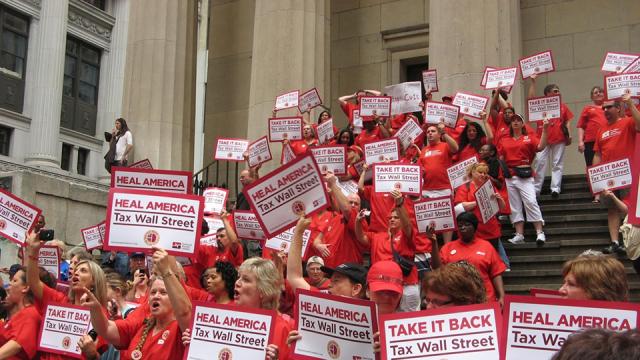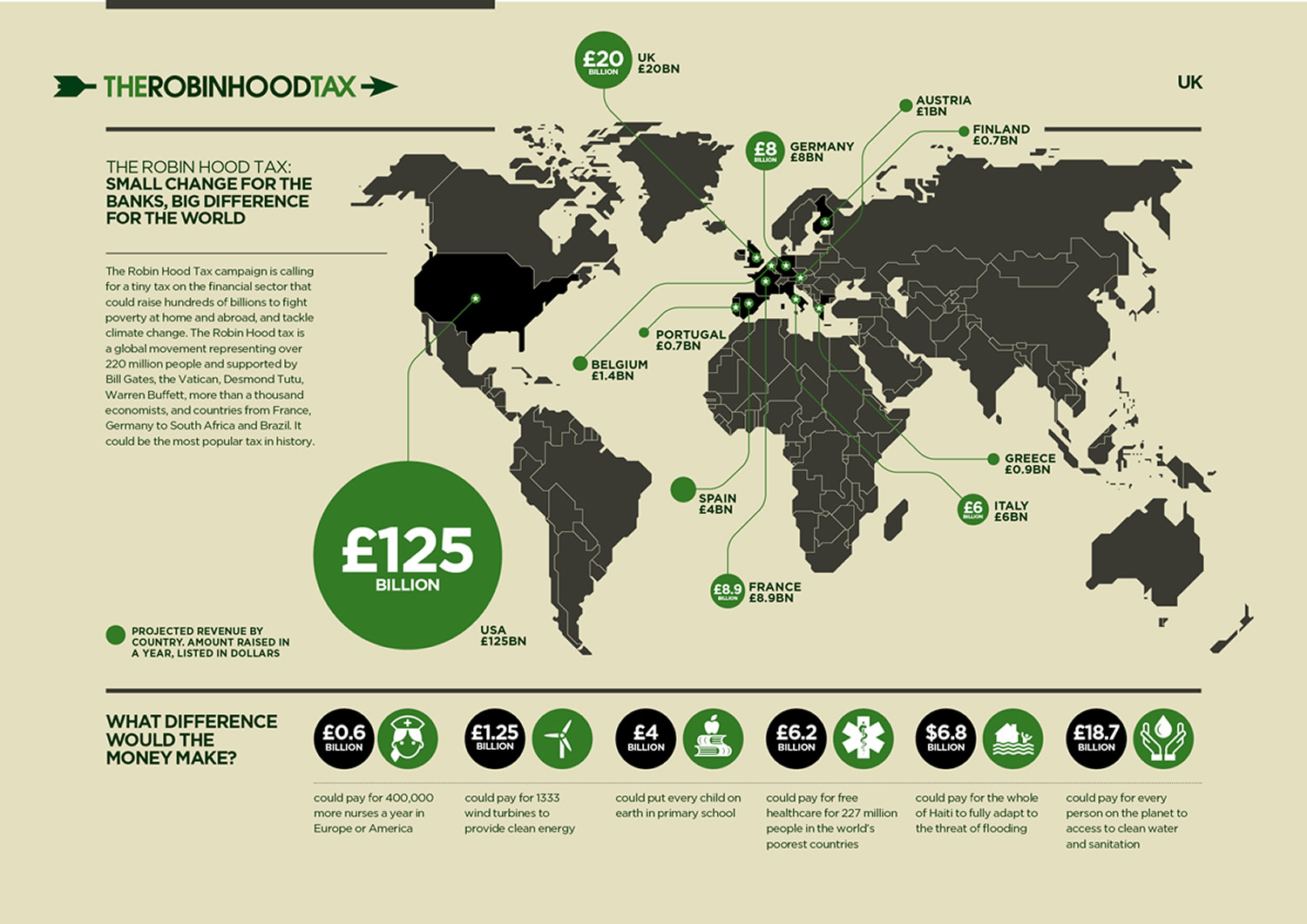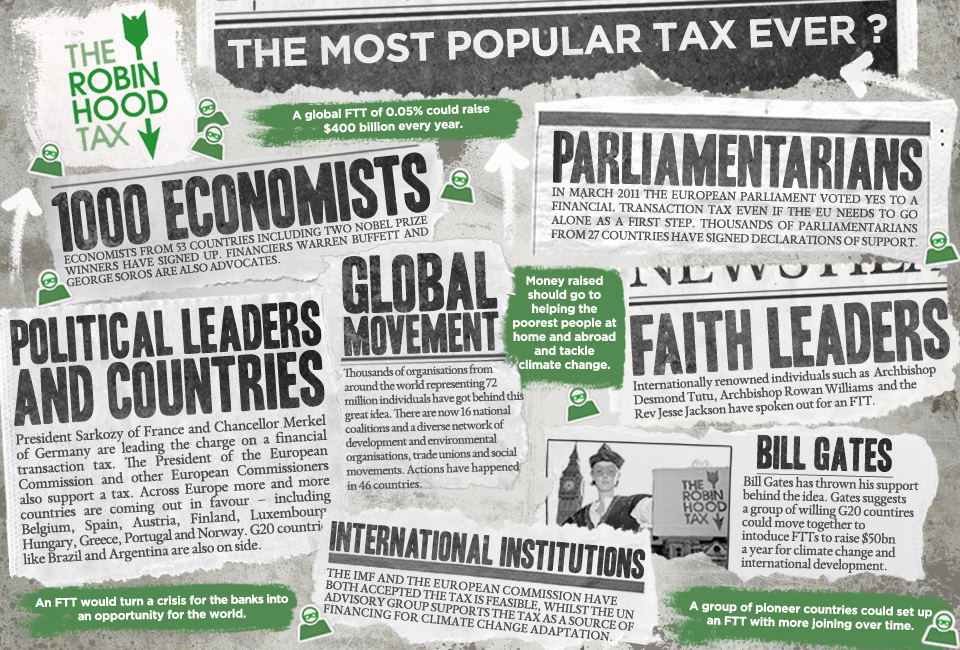
More than a thousand people gathered in Washington, D.C.’s Farragut Square on Saturday, April 20, to demand that a financial transaction tax be placed on derivatives and other forms of speculation. The proposed tax on financial transactions, detailed in a bill Rep. Keith Ellison, D-Minn., introduced to Congress two weeks ago, would generate more than $300 billion a year in revenue, thereby doing away with the need for the sequester currently forcing across-the-board budget cuts.
The Financial Transaction Tax, or Robin Hood Tax, has a broad base of support. Nurses, environmentalists, union workers, and people living with HIV/AIDS, for example, spoke at the rally on behalf of Americans who have been exploited at the expense of profit on Wall Street.
The tax resonates with many Americans because of its simplicity and concrete purpose—it takes a modest percentage of profits from a multitrillion dollar market on Wall Street and uses that revenue to rebuild the crumbling infrastructure that allowed financial corporations to generate their wealth in the first place.
Transaction taxes aren’t new. The United States had one from 1914 to 1966. In 1932, it was more than doubled to 0.05 percent to help recovery after the Great Depression. Today, more than 40 countries have a transaction tax, with 11 in the European Union, including Germany and France.
After 1966, the tax was eliminated and replaced with a modest Financial Speculation Tax that now finances the Securities and Exchange Commission as well as the Commodities Futures Trading Commission, two agencies Wall Street emaciated in the following decades.
The transaction tax is also meant to rein in speculative trading and help prevent financial bubbles that in the last 15 years have become a chronic problem.
“It’s actually a good, old-fashioned economic solution,” Jared Bernstein, former chief economist and economic adviser to Vice President Joe Biden, wrote in support of the tax. “Internalize the negative externalities of bad risk pricing and volatility but making it more expensive to lurch...It would also raise some much needed revenue which, if I’m right, we’re going to need the next time the herd runs off the cliff...together.”
Sixty percent of Americans support a transaction tax, including such people as Warren Buffett, Eliot Spitzer, Larry Summers and the members of The Boston Globe editorial board.
“As Obama and other policymakers contemplate far-reaching changes to entitlements such as Medicare and Social Security,” The Boston Globe editorialized in 2011, “a financial transaction tax—which would simultaneously raise money and deter another crisis—has to be part of the discussion.”
Although we do not yet have a financial transaction tax, President Obama is moving forward with cuts to social programs, public services, Medicare/Medicaid and Social Security.
At the rally Saturday, speakers said that cuts to any sector of the economy were an assault on the general public.
“We’re losing transit as a result of what’s happened to our economy, as a result of the fact that our government has seen fit to bail out banks but not people,” Amalgamated Transit Union President Larry Hanley explained to the crowd of protesters wearing Robin Hood hats. “Let me tell you, there’s something perverse in a nation that sees fit to slash transit services to people who need it, at a time when people are losing their jobs and have fewer cars.“When I was growing up,” he continued, “when I was in school, they talked about citizenship because we were citizens. But somewhere along the line they turned us into consumers and then taxpayers, as if the only role we serve in life is to be angry taxpayers, angry at everybody else who is struggling in this country.”
A growing private sector and shrinking public one does not bode well for people who have little economic value. Those who depend on food stamps, affordable housing, Medicaid, Medicare and other forms of government assistance are the first to feel that shift’s pinch.
In the most recent study on poverty-related deaths, researchers at Columbia University’s Mailman School of Public Health found that 875,000 people died in the U.S. as a result of social factors such as poverty and income inequality in 2000, when income disparity was much smaller than it is today.
“People living with HIV and AIDS depend on medication to live,” activist Jose Demarco told the demonstrators, speaking on behalf of the sick who cannot afford patented drugs. “Our fate is miserable, slow, painful deaths. This year the budget did not include money for AIDS drugs. What are we supposed to do? Die.”
Originally published by the Center for Study of Responsive Law.
3 WAYS TO SHOW YOUR SUPPORT
- Log in to post comments














